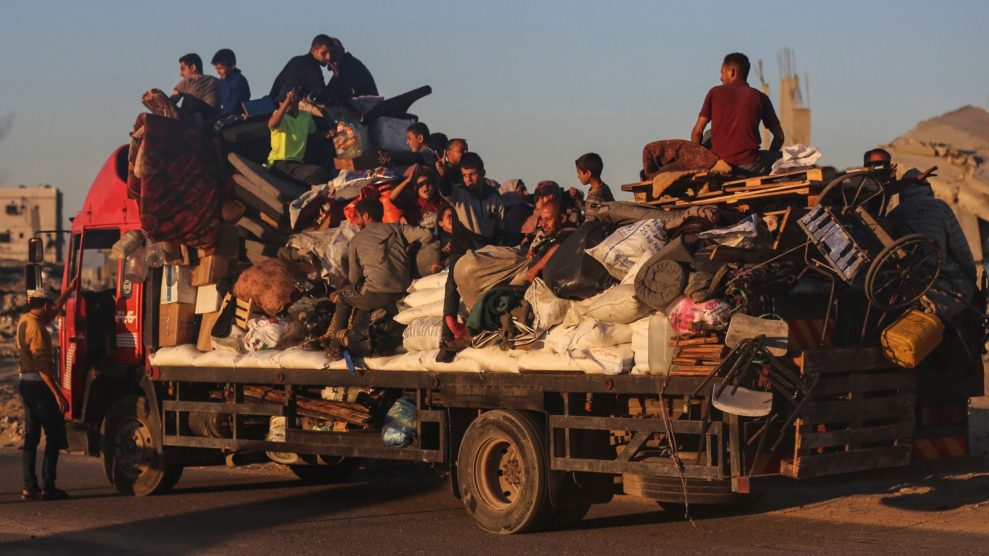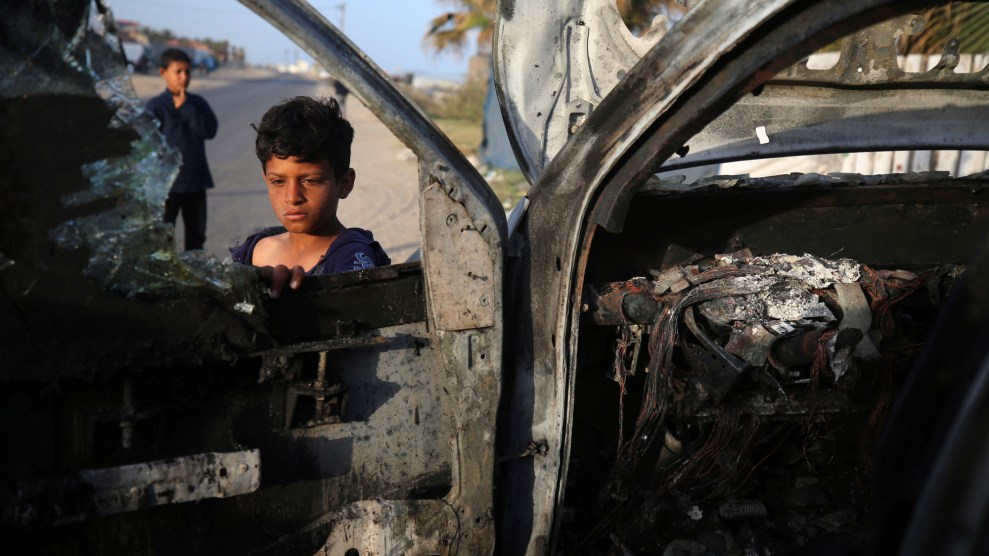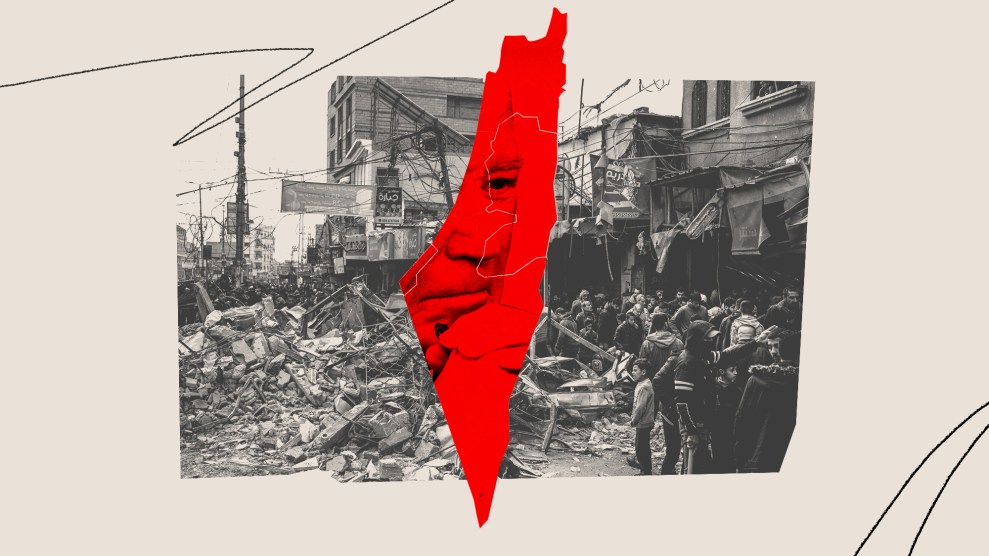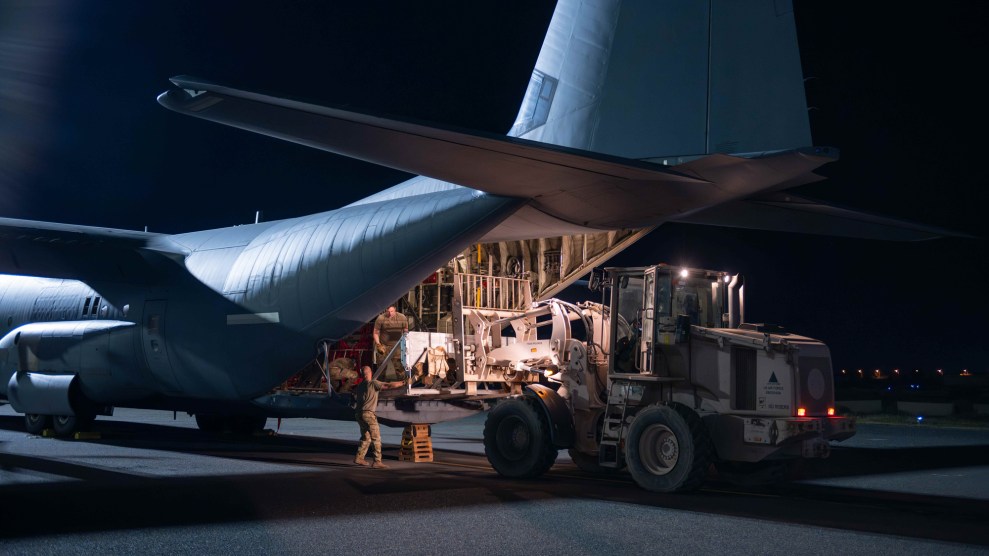
Displaced Palestinians from Rafah arrive in Khan Yunis after Israel's evacuation order.Majdi Fathi/NurPhoto/AP
Humanitarian officials are warning of increasingly dire conditions in Rafah as the Israeli army orders tens of thousands of civilians to evacuate the city in advance of further operations in the city.
The situation is “absolutely catastrophic,” UNICEF spokesperson Tess Ingram told ABC’s Martha Raddatz on “This Week” Sunday. Approximately 300,000 people have fled Rafah this week, Ingram said, “piling onto donkey carts, trucks, busses, possessions, people.”
“We even saw people loading a toilet onto the back of a truck—which just shows how desperate the situation is, that people feel like they need to bring these sort of items,” Ingram added. “When we talk about having safety for people, it’s not just safety from the bombardments that they need. It’s also a safe place to go to. And the places where people are being told to move to are completely unsafe.”
“When we talk about having safety for people, it’s not just safety from the bombardments…It’s also a safe place to go to and the places where people are being told to move to are completely unsafe," UNICEF spokesperson Tess Ingram says. https://t.co/RLudONJfCD pic.twitter.com/UYxEHoQfXj
— This Week (@ThisWeekABC) May 12, 2024
A senior UNICEF official for Gaza, Hamish Young, issued a statement on Saturday warning that “families lack proper sanitation facilities, drinking water and shelter,” and that “people are making improvised toilets by digging holes in the ground around groups of tents” in Al-Mawasi, a so-called humanitarian zone about six miles northeast of Rafah where Palestinians have been ordered to evacuate. He added that virtually no fuel or humanitarian aid had entered the Gaza Strip in five days. On Friday, the World Food Programme said only one bakery in Rafah is functioning.
Medical care is also in crisis. A volunteer nurse at Rafah’s only maternity and neonatal hospital told me on Thursday that Israel’s seizure of the Rafah border crossing—a vital passageway for aid into Gaza—has led to women giving birth without pain medication, and the hospital running low on basic supplies like gloves and scissors. An official with a humanitarian organization supporting the hospital told “Democracy Now” on Thursday that it only had three days of fuel. The nurse told me 50 newborns in the intensive care unit are at risk of death if the hospital is ordered to evacuate.
Late on Friday, the State Department released a delayed report examining the Israeli army’s conduct and use of US provided-weapons, finding that “it is reasonable to assess” that it has deployed them “in instances inconsistent with its [international humanitarian law] obligations or with established best practices for mitigating civilian harm.”
“While Israel has the knowledge, experience, and tools to implement best practices for mitigating civilian harm in its military operations, the results on the ground, including high levels of civilian casualties, raise substantial questions as to whether the IDF is using them effectively in all cases,” the report adds.
Despite such findings, and a recent pause in the delivery of 3,500 so-called dumb bombs, the U.S. is still allowing most weapons exports to Israel, Secretary of State Antony Blinken confirmed on CBS’s “Face the Nation” on Sunday. But that could change, Blinken warned, if Israel unleashed new major attacks. “If Israel launches this major military invasion into Rafah, then there’s certain systems that we’re not going to be supporting and supplying for that operation,” Blinken said.
Asked if the U.S. is pausing any weapons shipments to Israel apart from 3,500 so-called ‘dumb bombs,’ @SecBlinken says “The answer to that is no,” but adds that if Israel invades Rafah, “there's certain systems that we're not going to be…supplying for that operation.” pic.twitter.com/yLQHpkG0lQ
— Face The Nation (@FaceTheNation) May 12, 2024
The report also states that American officials “do not currently assess that the Israeli government is prohibiting or otherwise restricting the transport or delivery of U.S. humanitarian assistance” to Gaza. That assessment is at odds with the experiences of more than 20 humanitarian organizations operating on the ground, who said last month that Israeli authorities “consistently and arbitrarily denied, restricted, and impeded” US-funded aid to Gaza.
One signatory, the International Rescue Committee, said it was “deeply disappointed” with the report. “If humanitarian aid was flowing unhindered and at scale, one million people would not be in famine conditions and the U.S. government would not be engaging in last resort options like air drops or expensive maritime routes,” Flora Alexander, IRC’s vice president of advocacy, said in a statement. Amanda Klasing of Amnesty International USA said the report “seems like the international version of ‘thoughts & prayers:’ admitting there’s a problem but not doing anything meaningful to prevent the further loss of lives.”
Blinken denied the U.S. deploys “double standards” while defending the report on NBC’s “Meet the Press” on Sunday. “We treat Israel, one of our closest allies and partners, just as we would treat any other country.”


















